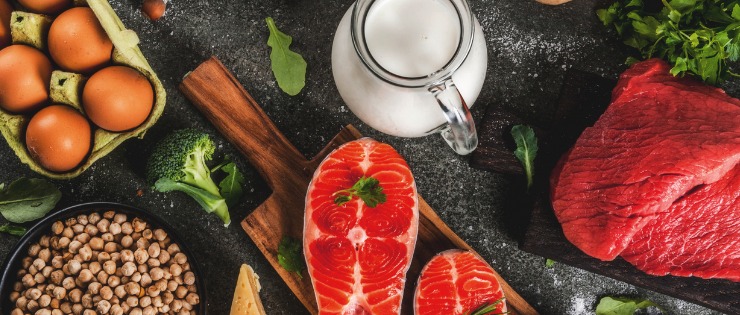
Protein is vital to keep your body strong and healthy, but do you know if you are eating enough protein or even eating too much?
Vegetarians and vegans need to be particularly aware of getting enough protein in their diet because most complete sources of protein are animal-based.
People who exercise a lot - like athletes and bodybuilders - also have unique protein requirements.
Let’s look at what protein is, why it matters and how to make sure you eat the right amount.
What is Protein?
Proteins are large molecules that your body needs to function properly. In fact, protein makes up roughly 50% of your body’s dry weight.
All proteins are made from the same 20 amino acids (known as building blocks) but combined in different ways. Unlike fats and carbohydrates, the body has no way of storing protein for later consumption so we have to eat it regularly.
Why Do Our Bodies Need Protein?
Inside your body, proteins are being broken down and created all the time. The amino acids inside the protein you eat are digested, then used to form new proteins like hormones and enzymes.
The human body is made of tissue, muscle and organs and within every cell are proteins which are constantly broken down and replaced. Protein is an important building block for bones, muscles, cartilage, skin, and blood. Many of the body’s chemicals, hormones and enzymes require protein for their production and function.
Types of Protein
Not all proteins are equal. There are two main types of protein – complete and incomplete.
Complete Protein
Also known as ‘high quality proteins’, animal-based foods like meat, fish, poultry, eggs, milk and cheese are called complete proteins because they contain all the essential amino acids.
There are only a few plant-based complete proteins. Quinoa, buckwheat and soybeans contain all essential amino acids so qualify as complete proteins.
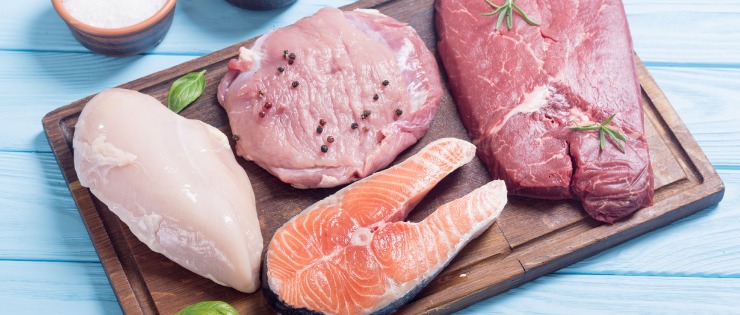
Incomplete Protein
Incomplete protein sources are low in one or more essential amino acids. Eating a variety of incomplete proteins will still give your body all the amino acids it needs. Incomplete proteins are also called ‘complementary proteins’. Rice only contains certain essential amino acids, so it’s an incomplete source of protein but beans contain other amino acids, so together rice and beans can be complementary sources of protein.
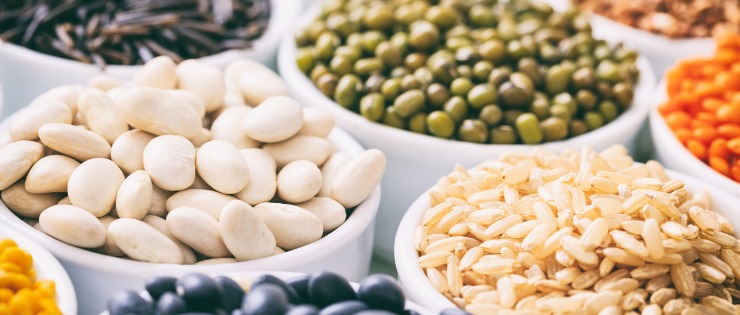
Sources of Protein
When we think of protein, red meat comes to mind but protein is found in many foods including:
Poultry – a 100g piece of poultry contains around 11 grams of protein. Chicken, turkey and duck are all good sources of vitamins and minerals.
Fish – an 85g piece of fish contains as much as 20 g of protein. Fish and seafood are an excellent source of omega-3 fatty acids which reduce the risk of heart disease and stroke. Cook fish by steaming or baking rather than frying it in oil.
Red Meat – 100g of red meat has as much as 26g of protein. Meat is also a good source of vitamins and minerals such as iron, zinc, selenium and B vitamins. Avoid processed meats as they’re high in salt and saturated fat.
Eggs – A large egg contains around 7g of protein, 3g from the yolk and 4g from the white. A small egg can contain less than 5g of protein. Most of the nutrients and fat are in the yolk. Cooking eggs makes the protein more easily absorbed and accessible and also kills bacterial contamination and food poisoning.
Dairy – A 100g serving of skim milk contains 3.4g of protein and slightly less (3.2g) in whole milk. Powdered milk without water added is 26g of protein per 100g.
Grains – high quality grains like amaranth, quinoa, millet, couscous, oats and buckwheat contain between 6g and 9g of protein per cooked cup.
Protein Sources for Vegetarians and Vegans
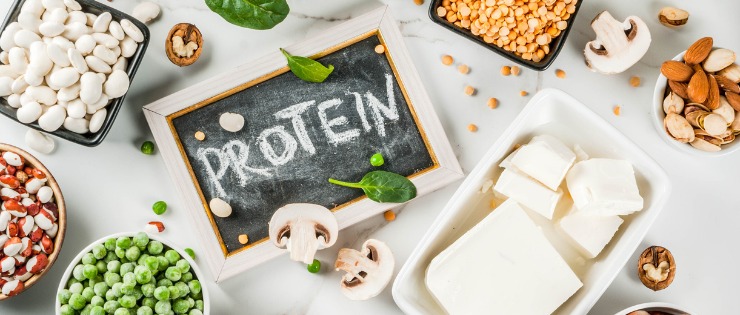
Animal products are the main source of complete proteins, so you may assume most vegetarians don’t have enough protein in their diet, but this isn’t the case at all.
You can eat enough protein on a vegetarian or vegan diet if you eat a variety of incomplete proteins and combine them into complementary sources of protein.
If you’re vegetarian or vegan, try including some of these excellent sources of protein on your plate each day.
Tofu – made from soybeans, which are a whole source of protein, tofu contains up to 19g of protein per 100g. A good source of iron and calcium and the minerals manganese, selenium and phosphorous.
Legumes – adding legumes to a main meal is a good way to bulk up a meal without adding more meat and helps the budget. Lentils have 9g of protein per 100g, pinto beans have 21g and green peas have 5g.
Chia Seeds – a 35g handful of chia seeds contains 6g of protein and 13g of fibre as well as iron, calcium, selenium and magnesium, and omega-3 fatty acids. Include the tiny seeds in drinks and home-baked goods.
Nuts – 30g of nuts contains around 7g of protein so nuts are an excellent source. They are also packed full of minerals and nutrients like iron, calcium, magnesium, selenium, phosphorus, and vitamin E. They are best eaten raw because heating nuts can damage their nutrient levels.
Wild rice – one cup of wild rice contains 6g of protein but it also has more lysine than brown rice which is one of the amino acids that is often lacking in plant-based diets.
Fruit and Vegetables – some fruits and vegetables have negligible amounts of protein but some are high in protein. Broccoli, spinach, asparagus, potatoes, sweet potatoes, artichokes and Brussels sprouts have the most protein, averaging 4 - 5g per cooked cup. Fruits like mulberries, blackberries, nectarines and bananas contain around 2 - 4g of protein per cup.
How Much Protein Do We Need?
People in Western countries who eat a healthy, balanced diet usually consume enough protein. The recommended intake is based on the basic nutritional requirements to keep the body functioning.
The Recommended Dietary Allowance (RDA) for protein in the US is 0.8g of protein per kilo of body weight. The UK Reference Nutrient Intake (RNI) recommends 0.75g of protein per kilo of body weight.
The Australian Government National Health and Medical Research Council provides the following recommendations by lifestage and gender:
Infants (7 -12 mths): 1.60g/kg (of body weight) = 14g/day average
All Children (1-3 yrs): 1.08g/kg = 14g/day average
All Children (4-8 yrs): 0.91g/kg = 20g/day average
Boys (9-13 yrs): 0.94g/kg = 40g/day average
Boys (14-18 yrs): 0.99g/kg = 65g/day average
Girls (9-13 yrs): 0.87g/kg = 35g/day average
Girls (14-18 yrs): 0.77g/kg = 45g/day average
Men: 0.84g/kg = 64g/day average
Women: 0.75g/kg = 46g/day average
Men and women over the age of 70 need 11 - 19g more per day to stay healthy. Women who are pregnant or breastfeeding also need more protein to meet the extra nutrient demands.
The amount of protein you need to consume daily depends on your body type and level of activity. Someone who is active needs more protein per day than a similar-sized sedentary person.
You can find your protein and other nutrient recommendations by entering your height, weight, age and activity level on the Dietary Reference Intakes (DRIs) calculator.
What Happens if We Don’t Get Enough Protein?
While protein deficiencies are rare, it can occur in people who don’t eat a balanced diet or in the elderly. Some of the symptoms of protein deficiency include:
- wasting of muscle tissue
- a build-up of fluids, mainly in the feet and ankles, known as oedema
- anaemia (the blood can’t deliver sufficient oxygen to the cells)
- slow growth in children.
Is Too Much Protein Bad for You?
Considering the vital role protein plays in the body, you might think the more protein the better, but however there are risks to consuming large quantities. Many people eat more protein than their body needs.
The main problem with too much protein is, if you are eating complete sources of protein such as a T-Bone steak often, you could be consuming too much saturated fat. We know this type of fat increases cholesterol levels and the risk of heart disease, stroke, cancer and diabetes.
Eating lots of processed meats like sausages and deli meats can increase your exposure to harmful carcinogens. Fish and poultry are better meat-based sources of protein.
An upper limit for protein doesn’t exist because it’s thought there are no adverse health effects from eating more than the recommended amount through consuming whole foods. However, people should take care not to consume more individual amino acids through supplements than they would consume through whole food.
Benefits of Protein for Training & Recovery
Eating protein-rich food is ideal before and after training. Strength training causes micro-tears in muscles which cause inflammation and stimulates the body’s repair process. The protein helps build and repair muscles.

Whey protein shakes are popular amongst bodybuilders and athletes because its complete protein source that’s easy to digest, is nutritionally high and has all the essential amino acids. Nutrients in the drinks help with muscle growth, gaining strength and decreases recovery time.
Made from the liquid produced during cheese manufacturing, whey protein also supports immune function, improves insulin response and reduces blood pressure. Protein powders are available in a range of flavours and are suitable for adding to baked goods to increase their nutritional and protein value.
There are many plant-based protein powders that are usually marketed as “vegan protein powders”. They are made from soy, peas, hemp and even algae. They may not be quite as effective as whey protein but are still a good way for people to get more protein if they don’t eat animal-based products.
Like most dietary advice, it’s best to eat a wide variety of foods so you can enjoy unprocessed sources of different types of protein as well as essential vitamins, minerals and fatty acids. Eating a balanced diet, high in plants and vegetables is a recipe for good health.
Problems with High-Protein Diets
Many people wanting to lose weight or build muscle, have turned to high-protein, low-carbohydrate diets in recent years. Often they see the desired results and continue but medical experts warn that the Atkins diet and others aren’t without their risks.
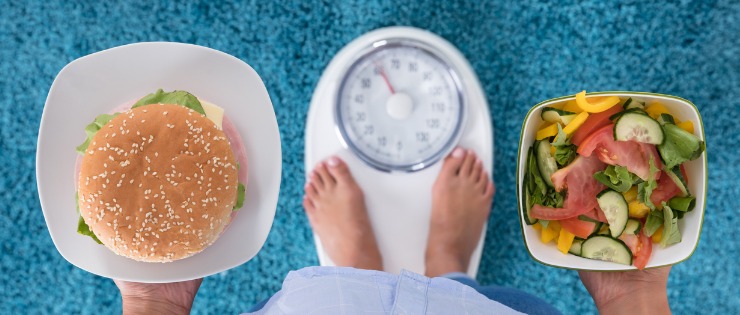
Some of these diets are based on drastically reducing your intake of carbohydrates so your metabolism changes into a state of ketosis. This means the body has no carbohydrates to burn, so it burns its own fat and releases small parts of carbon called ketones into the bloodstream so the body has enough energy. This process suppresses appetite and increases fluid loss through urine.
Long-term high-protein diets also cause higher levels of ammonia which is created when protein breaks down. We need more research to understand the long-term effects of increased ammonia levels in the body.
High quantities of protein cause higher levels of calcium to be lost in urine. It’s thought the body releases calcium stores to counteract the increase in acids created from the protein. A loss of calcium can cause osteoporosis.
When a diet is unbalanced and we avoid some food groups, vitamins and minerals may be missing. Eating a high protein diet could mean people aren’t eating the recommended daily intake of fruit and vegetables so they miss out on important nutrients that protect us from some diseases. Medical experts recommend eating a high-protein diet for no longer than six months before returning to a balanced diet.
While some people who followed a high-protein, low-carb diet had dramatic weight loss, the long term health effects have not been fully studied. We strongly recommend consulting with a medical professional like your doctor or nutritionist before trying any kind of diet.
Are You Getting Enough?
Whatever your diet preference, it‘s possible to get the protein your body needs from healthy sources of food. A vegetarian can eat a wide variety of foods containing protein while a carnivore eating a balanced diet need not worry that their diet is providing too much protein. If you’re concerned about eating the right amount of protein for your lifestyle, speak to your doctor or a nutritionist.